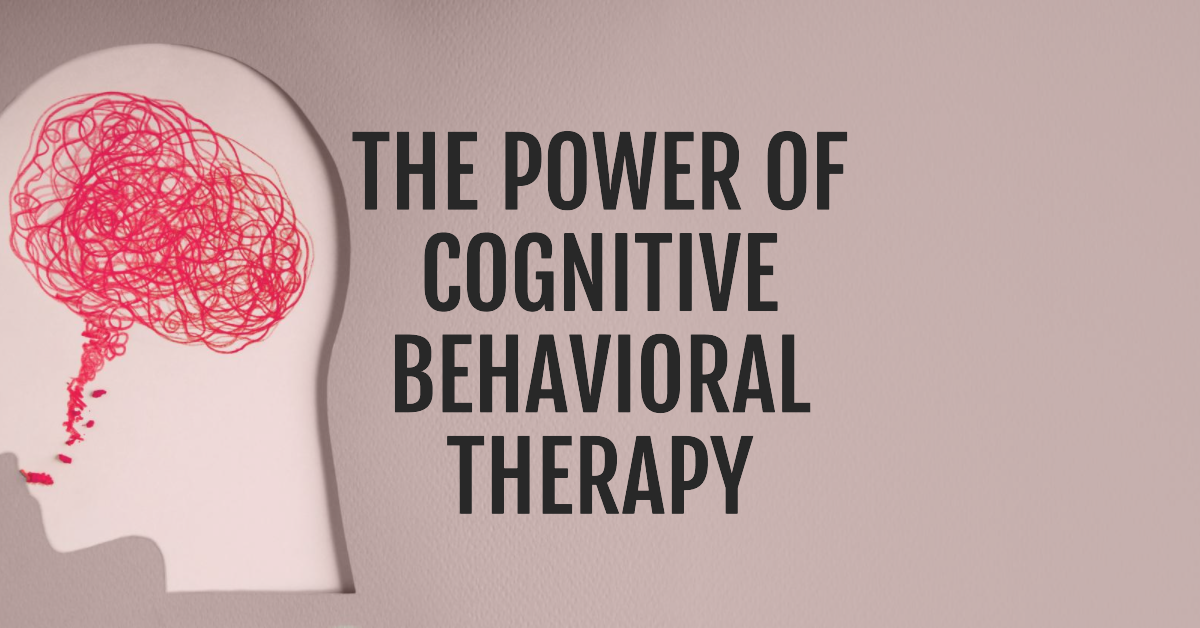Unlocking the Power of Cognitive Behavioral Therapy: How it Rewires Our Minds
Discover the transformative power of Cognitive Behavioral Therapy (CBT) as we delve into its core principles, methods, and potential to rewire our minds. Learn how CBT helps untangle negative thoughts, reshape behaviors, and confront fears, leading to lasting changes in brain structure and function. This blog explores the fascinating world of CBT, empowering you with coping skills to navigate life's challenges and embrace a more fulfilling, balanced existence.

In our fast-paced and ever-changing world, the human mind often becomes entangled in a web of thoughts, emotions, and behaviors that can lead to stress, anxiety, and depression. Cognitive Behavioral Therapy (CBT) emerges as a powerful tool that empowers individuals to untangle these knots and gain control over their minds. This transformative therapy has garnered significant attention in the field of mental health, not only for its effectiveness but also for its ability to rewire the way we think, feel, and act. In this blog, we will delve into the core principles of CBT, its methods, and the remarkable potential it holds for reshaping our minds.
Understanding Cognitive Behavioral Therapy
CBT is a therapeutic approach rooted in the idea that our thoughts, feelings, and behaviors are interconnected and can influence one another. Developed in the 1960s by Dr. Aaron T. Beck, CBT initially aimed to treat depression. However, it has since expanded to address a wide range of mental health conditions, including anxiety disorders, phobias, post-traumatic stress disorder (PTSD), and more.
The therapy rests on the notion that negative or irrational thoughts contribute to negative emotions and detrimental behaviors. By identifying and challenging these automatic negative thoughts, individuals can change their emotional responses and subsequently alter their behavioral patterns.
The Power of Restructuring Thoughts
One of the key principles of CBT is cognitive restructuring, where individuals learn to recognize and challenge cognitive distortions. These distortions are cognitive patterns that magnify negative aspects of situations and minimize positive aspects. Common cognitive distortions include:
- All-or-Nothing Thinking: Perceiving situations in absolutes, with no room for shades of gray.
- Overgeneralization: Making sweeping conclusions based on isolated incidents.
- Catastrophizing: Assuming the worst-case scenario will inevitably happen.
- Personalization: Taking ownership of circumstances that are outside of one's influence.
By actively disputing these distortions, individuals can reframe their thoughts in a more balanced and rational manner. For example, transforming "I failed this test; I'm a complete failure" into "I didn't perform as well as I wanted on this test, but it doesn't mean I'm a failure" can have a profound impact on self-esteem and emotional well-being.
Behavioral Activation: Taking Control of Actions
CBT also emphasizes the importance of behavioral activation. This involves engaging in activities that bring pleasure, fulfillment, and a sense of achievement, even when one might not initially feel motivated to do so. By breaking the cycle of withdrawal and avoidance, individuals can counteract depression and improve their mood. Behavioral activation often complements cognitive restructuring by helping individuals align their actions with their newly restructured thoughts.
Exposure Therapy: Confronting Fears Head-On
For individuals dealing with anxiety disorders or phobias, exposure therapy is a fundamental aspect of CBT. This technique involves gradually facing feared situations or objects in a controlled and safe environment. Over time, repeated exposure helps reduce anxiety responses, allowing individuals to regain control over their lives.
Mindfulness: Embracing the Present Moment
Mindfulness, borrowed from Eastern contemplative practices, has become a key component of many CBT interventions. By cultivating non-judgmental awareness of the present moment, individuals can observe their thoughts and emotions without getting entangled in them. This detachment fosters a sense of inner peace and allows for a more rational and measured response to stressors.
The Neuroplasticity Connection: Rewiring Our Brains
The fascinating aspect of CBT's impact on the mind lies in the realm of neuroplasticity – the brain's ability to reorganize and form new neural connections throughout life. As individuals engage in CBT techniques, such as cognitive restructuring, behavioral activation, and mindfulness, their brains adapt and rewire.
Neuroimaging studies have shown that CBT can lead to changes in brain structure and function. For instance, it can reduce activity in the amygdala, the brain region responsible for processing fear and anxiety, while increasing activity in the prefrontal cortex, associated with higher-order thinking and emotional regulation. These changes underpin the transformation that occurs within the mind during the therapeutic process.
Personal Growth Beyond Therapy
One of the significant advantages of CBT is that it equips individuals with essential coping skills that extend beyond the therapy room. The tools learned in CBT empower people to navigate life's challenges with resilience and adaptability. As individuals practice these skills consistently, they become more adept at identifying and managing negative thought patterns, effectively dealing with stress, and maintaining emotional well-being.
Conclusion
Cognitive Behavioral Therapy stands as a beacon of hope for those struggling with the complexities of the human mind. By helping individuals understand the interplay between thoughts, feelings, and behaviors, CBT offers a pathway to untangle emotional knots and build a stronger, healthier mind. Its power lies not only in the transformation it brings but in the lasting impact it has on our neural connections and our approach to life. With CBT, we can indeed unlock the potential to reshape our minds and embrace a more fulfilling and balanced existence.










